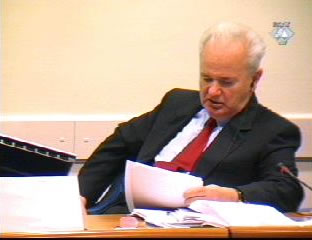Home
MILOSEVIC AND SELF-DEFENCE
At the request of the Trial Chamber, the Australian amicus curiae, Professor McCormack analyses possible situations in which Slobodan Milosevic could claim that the crimes he is charged with were committed in self-defense.
 Slobodan Miloševic during the cross examination
Slobodan Miloševic during the cross examination Can Slobodan Milosevic, in his response to the 66 counts contained in the indictments for crimes in Croatia, Bosnia and Herzegovina and Kosovo, claim they were committed in self-defence?
This is the question that the judges posed to the amici curiae. The Australian professor Timothy McCormack answered on their behalf. Two of his filings – each more than 30 pages long – have already been made public by the Tribunal. They deal with the possibility that Milosevic might plead self-defence for the crimes committed in Croatia and Kosovo. The filing about the self-defence in relation to the crimes in Bosnia and Herzegovina is to be disclosed soon.
Professor McCormack envisages two possible situations in which the issue of self-defence may become relevant in the Milosevic case. The first would be if he were to state that individual Serb soldiers, paramilitaries and police officers or their units committed crimes he is charged with - in legitimate self-defence. In that case, their actions would have to meet the criteria of customary international law, stated in the Statute of the International Criminal Court. In other words, they would have to have reacted in the face of an “imminent and unlawful” force, in a “manner proportionate to the degree of danger” and they would have to have acted “reasonably” to defend themselves. If all the criteria were met, the Australian amicus curiae deems that Milosevic would not be responsible for the acts of his subordinates who had acted in legitimate self-defence. In making the assessment whether the criteria have been met, "the key issue is the issue of proportionality", McCormack says, and concludes:
“The use of overwhelming and disproportionate military force purportedly in self-defence raises serious questions about the real motivations for the forceful response.”
Milosevic could, McCormack continues, claim that he intervened militarily in order to defend his country against illegal military forces in Kosovo and in Croatia. Serbia, the amicus curiae claims, had the right to use military force in order to counter the armed insurrection in Kosovo and to defend its territorial integrity. Furthermore, while the SFRY still existed as an internationally recognized state, the JNA had the right to use military force to defend its sovereignty and the territorial integrity of the country. As Milosevic kept on repeating during the prosecution case, they were threatened by a unilateral and unconstitutional secession of Croatia. McCormack reminds that the accused claimed with equal persistency that after the break-up of Yugoslavia, Serbia had the right to use force in order to defend the Serb community in Croatia which was under threat.
In both cases, the "issue of proportionality" is again of paramount importance. The right to use force to defend the sovereignty and integrity of a state, McCormack stresses, “does not excuse the perpetration of international crimes in violation of either international humanitarian law or international human rights law.”
In the course of the prosecution case, and particularly in the Kosovo stage, Milosevic showed in his cross-examination of some Western generals, such as Klaus Naumann, Michel Maisonneuve and others, that it is quite difficult for him to grasp the "principle of proportionality" to which the witness kept pointing. It seemed that he simply could not get basic idea of the principle.
The indictment charging Milosevic for crimes against humanity in Croatia contains “nothing that challenges the international legal right of the JNA to engage militarily in Croatia against the armed forces of Croatia prior to Croatia independence”, amici curiae noted. Instead, all 32 counts of the indictment represent allegations of crimes committed in direct attacks on civilians, McCormack pointed out and concluded:
“It is difficult to imagine how any deliberate attack on civilians or civilian property could be undertaken in the legitimate defence of territorial integrity and national security of any state.”
Linked Reports
- Case : Milosevic Slobodan - "Kosovo, Croatia and Bosnia"
- 2004-02-25 MILOSEVIC'S DEFENCE CASE SET TO BEGIN ON 8 JUNE
- 2004-02-25 PROSECUTION WILL NOT CONTINUE WITH ITS CASE AGAINST MILOSEVIC
- 2004-02-22 WHAT IF MILOSEVIC DOES NOT CONSENT TO A REPLACEMENT FOR JUDGE MAY?
- 2004-03-04 "SELF-DEFENCE" IS NOT A VIABLE OPTION FOR THE CRIMES IN BOSNIA AND HERZEGOVINA
- 2004-03-05 1.5 MILLION DOLLARS FOR "EXCULPATORY EVIDENCE" IN THE MILOSEVIC CASE
- 2004-03-08 SCOPE OF MILOSEVIC'S RESPONSIBILITY TO BE DETERMINED BY DATES
